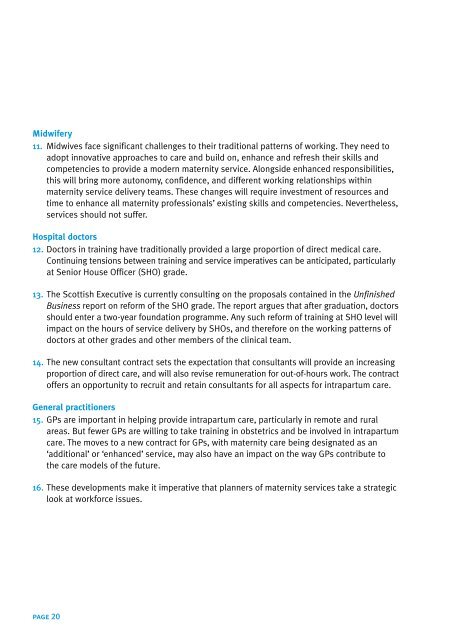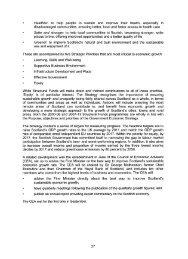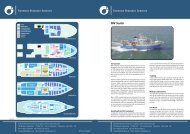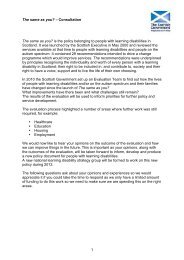Implementing A Framework for Maternity ... - Scottish Government
Implementing A Framework for Maternity ... - Scottish Government
Implementing A Framework for Maternity ... - Scottish Government
You also want an ePaper? Increase the reach of your titles
YUMPU automatically turns print PDFs into web optimized ePapers that Google loves.
Midwifery<br />
11. Midwives face significant challenges to their traditional patterns of working. They need to<br />
adopt innovative approaches to care and build on, enhance and refresh their skills and<br />
competencies to provide a modern maternity service. Alongside enhanced responsibilities,<br />
this will bring more autonomy, confidence, and different working relationships within<br />
maternity service delivery teams. These changes will require investment of resources and<br />
time to enhance all maternity professionals’ existing skills and competencies. Nevertheless,<br />
services should not suffer.<br />
Hospital doctors<br />
12. Doctors in training have traditionally provided a large proportion of direct medical care.<br />
Continuing tensions between training and service imperatives can be anticipated, particularly<br />
at Senior House Officer (SHO) grade.<br />
13. The <strong>Scottish</strong> Executive is currently consulting on the proposals contained in the Unfinished<br />
Business report on re<strong>for</strong>m of the SHO grade. The report argues that after graduation, doctors<br />
should enter a two-year foundation programme. Any such re<strong>for</strong>m of training at SHO level will<br />
impact on the hours of service delivery by SHOs, and there<strong>for</strong>e on the working patterns of<br />
doctors at other grades and other members of the clinical team.<br />
14. The new consultant contract sets the expectation that consultants will provide an increasing<br />
proportion of direct care, and will also revise remuneration <strong>for</strong> out-of-hours work. The contract<br />
offers an opportunity to recruit and retain consultants <strong>for</strong> all aspects <strong>for</strong> intrapartum care.<br />
General practitioners<br />
15. GPs are important in helping provide intrapartum care, particularly in remote and rural<br />
areas. But fewer GPs are willing to take training in obstetrics and be involved in intrapartum<br />
care. The moves to a new contract <strong>for</strong> GPs, with maternity care being designated as an<br />
‘additional’ or ‘enhanced’ service, may also have an impact on the way GPs contribute to<br />
the care models of the future.<br />
16. These developments make it imperative that planners of maternity services take a strategic<br />
look at work<strong>for</strong>ce issues.<br />
page 20

















